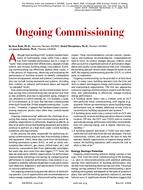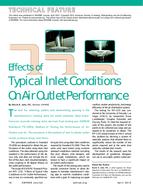Analyses the relationship between a controlled differential flow and the actual infiltration flows from the surrounding spaces. Examines several fairly simple cases to establish some limits to the applicability of this concept. Concludes that the method is extremely reliable when the pressurised space is in contact with only one other space, but in more complicated layouts, infiltration paths significantly increase the flow difference needed for negative pressurisation. Also in more complicated layouts changes in the surrounding pressures can cause pressurisation to fail. Recommends that infiltration paths to spaces with varying pressures (including the outside of the building) should be minimised.
KEYWORDS: year 1996, Air flow, rooms, pressurisation, air infiltration
Citation: ASHRAE Trans. 1996, vol.102, part 1, paper no.3933, 18-25, 9 figs, refs.
Product Details
- Published:
- 1996
- File Size:
- 1 file , 860 KB
- Product Code(s):
- D-16509


